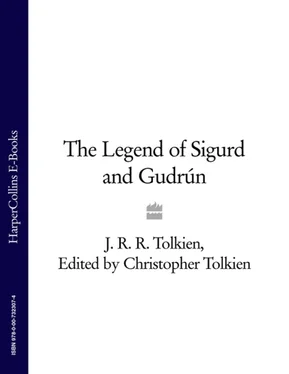J. Tolkien - The Legend of Sigurd and Gudrún
Здесь есть возможность читать онлайн «J. Tolkien - The Legend of Sigurd and Gudrún» — ознакомительный отрывок электронной книги совершенно бесплатно, а после прочтения отрывка купить полную версию. В некоторых случаях можно слушать аудио, скачать через торрент в формате fb2 и присутствует краткое содержание. Жанр: Старинная литература, на английском языке. Описание произведения, (предисловие) а так же отзывы посетителей доступны на портале библиотеки ЛибКат.
- Название:The Legend of Sigurd and Gudrún
- Автор:
- Жанр:
- Год:неизвестен
- ISBN:нет данных
- Рейтинг книги:5 / 5. Голосов: 1
-
Избранное:Добавить в избранное
- Отзывы:
-
Ваша оценка:
- 100
- 1
- 2
- 3
- 4
- 5
The Legend of Sigurd and Gudrún: краткое содержание, описание и аннотация
Предлагаем к чтению аннотацию, описание, краткое содержание или предисловие (зависит от того, что написал сам автор книги «The Legend of Sigurd and Gudrún»). Если вы не нашли необходимую информацию о книге — напишите в комментариях, мы постараемся отыскать её.
The Legend of Sigurd and Gudrún — читать онлайн ознакомительный отрывок
Ниже представлен текст книги, разбитый по страницам. Система сохранения места последней прочитанной страницы, позволяет с удобством читать онлайн бесплатно книгу «The Legend of Sigurd and Gudrún», без необходимости каждый раз заново искать на чём Вы остановились. Поставьте закладку, и сможете в любой момент перейти на страницу, на которой закончили чтение.
Интервал:
Закладка:
15
helm goldhrodene, Huna mænigo,
sadol seolforweredne, serc scynestan,
blancan betstan bitolhæbbendne,
wæde wealhbeaswe, ond wacne gar.
Cwæþ þæt he giefan wolde inc Gnitanhæðe,
20
weald þone widan on geweald sellan,
ofer giellendne gar ond gylden stefn,
maðmas micle, mearce Dænepes,
ond þæt mære holt – Myrcwudu hatte.’
Ða heafod hylde helm Burgenda,
25
Hagenan sægde: ‘Þa wit hyraþ swelc,
hwæt rædeþ unc se rinc, runbora geonga?
On Gnitanhæðe ic gold ne gefrægn
þæt wit oþres ne ahten efnmicle sped.
Wit seld agon seofon sweordum gefylled,
30
þára sint hiltu gehwilces heawen of golde;
mearh is mín mærest, mece betsta,
helm hwitesta ond hilderand
ahyþed of horde hean Caseres –
þonne ealra Huna an is min betera.’
35
Hagena
‘Hwæt biecnede seo bryd þa heo unc beag sende,
weargloccum wand? wearnunge geteah!
Þy ic wriðen fæste þær wulfes hær
hares hæþstapan on hringe fand,
wylfen, þæs ic wene, bið uncer waþ heonan.’
40
Ætla sent to Guðhere a bold messenger
riding – Cnéofrið was his name:
he came to the courts of Gifeca, to the hall of Guðhere;
about the hearth warriors rejoiced in the ale.
The men of that company drank in the gloomy hall,
5
the
meldan
sat hiding their thoughts;
the warriors feared the hatred of the Huns.
The man from the south cried out with a fell voice,
Cnéofrið, the stranger in the hall:
‘Hither upon an errand Ætla sent me
10
on unknown ways through the Vistula forest
riding the bit-bridled steed;
he bade me greet well you twain, Guðhere, and ask
that you come covered by your helms to his abode.
There you shall have shield and smooth-shaven lance
15
gold-adorned helmet, a great company of Huns,
silvered saddle, coat of mail most shining,
the finest horse that bears a bridle,
clothes of foreign scarlet, and slender spear.
He said that he would give to you Gnitanheath,
20
give into your power the wide woodland,
shrieking spear and golden prow,
great treasures, the abodes of the Dnieper,
and that forest renowned that is called Mirkwood.’
Then the lord of the Burgundians turned his head,
25
to Hagena he spoke: ‘When we hear such things
what does he advise us, the young counsellor?
I have not heard of a gold hoard on Gnitanheath
that we twain did not possess another of as great abundance.
We have seven halls filled with swords,
30
the hilts of each of them hewn of gold;
my horse is the most renowned, my sword the best,
my helm the brightest, my battle-shield
plundered from the treasure of the high emperor –
mine alone is better than [those] of all the Huns.’
35
Hagena
‘What did the bride signify when she sent us a ring,
wound it with wolf-hair? She offered us warning!
Fast bound on the ring I found the hair of a wolf,
of the grey heath-roamer:
wolvish, as I think, will be our journey hence.’
40
Notes
1 Ætla, Guðhere : the Old English forms of the Norse names Atli and Gunnar.
2 Cnéofrið : the name of Atli’s messenger in Atlakviða is Knefröðr: see the commentary on the Lay of Gudrún, stanzas 37–48.
3 Gifeca : the Old English form of the Norse name Gjúki, father of Gunnar: see Appendix A, p.340.
5–6 In a lecture on the text of Atlakviða my father took the meaning of the verse at this point to be that there was merriment in the hall among Gunnar’s folk, but the Hunnish envoys sat silent, hiding their thoughts. But his Old English verses may not proceed from this interpretation.
The Old English word melda means one who declares, tells, informs, or betrays. The man in Beowulf who stole the goblet from the dragon’s hoard and led Beowulf and his companions to the lair is called a melda. But I do not know what significance my father gave to the word in this verse.
11 Wistlawudu. This name occurs in the poem Widsith :
ful oft þær wig ne alæg,
þonne Hræda here heardum sweordum
ymb Wistlawudu wergan sceoldon
ealdne eþelstol Ætlan leodum.
‘Seldom was warfare stilled, when the host of the Hrædas [Goths] about the Vistula forest had to defend with their swords their ancient dwelling-place from the people of Attila.’
The reference to Wistlawudu is a vestige of very ancient tradition; for it was about the end of the second century that the Goths departed on a vast south-easterly migration from the Baltic coast and the Vistula valley, and at length settled in the plains to the north of the Black Sea. But in Widsith ‘the Vistula forest’ is thought of as the primeval forest separating the territories of the Goths and the Huns, and is to be equated with Myrkviðr (see the commentary on the Lay of the Völsungs, VII.14 (pp.227–28): in Atlakviða Knefröðr says that he had ridden through Myrkvið inn ókunna , Mirkwood unexplored.
20 Ætla’s offer (following Atlakviða ) of ‘Gnitanheath’, where Fáfnir had his lair, as if it were a part of his dominion constitutes a problem to which a number of solutions have been proposed. My father thought it probable that there was an ancient association of Gnitaheiðr with a gold hoard, of which we know nothing, and that this caused it to be attracted to Fáfnir, that is, became later the name of the region where he had his lair and his treasure. I cannot account for the form Gnitanheath.
27 The word runbora seems not to be recorded in Old English, but I take it to mean ‘one who bears run ’ in the sense of ‘(secret) counsel’, hence ‘counsellor’, equivalent to the recorded word rædbora of the same meaning.
36 Hagena : Högni.
37 weargloccum ‘wolf’s hair’: in Old English the word wearg was used exclusively of an outlaw or hunted criminal but Norse vargr retained in addition the sense ‘wolf’. From this was derived the name of the Wargs of Middle-earth.
39 The word hæðstapa ‘heath-roamer’ occurs in Beowulf, where it is used of a stag. In Atlakviða the word used is heiðingi , of similar meaning: see the commentary on the Lay of Gudrún, stanzas 37–48, where the verse in the Norse poem is cited.
II
This second text corresponds to verses much further on in Atlakviða, beginning at stanza 24, Hló þá Högni... ‘Then Högni laughed...’ The passage in the Lay of Gudrún is stanzas 127–130.
After line 19 my father evidently rejected a passage from his poem, since it is not repeated in the finished copy. The Old English poem takes up again, and concludes, with Atlakviða stanza 32, Lifanda gram..., ‘the living prince...’
Þa hlog Hagena þe man heortan scear
of cwican cumbolwigan – cwanode lyt;
blodge on beode to his breðer gæf.
Þa se gar-niflung Guðhere spræc:
‘Her is me heorte Hagenan frecnan,
5
ungelic heortan eargan Hellan;
bifaþ heo lythwon nu on beode liþ,
efne swa lyt bifode þa on breoste læg.
Swa scealtu, Ætla, ealdum maðmum,
leohte life samod beloren weorðan! ;
Her æt anum me is eal gelang
hord Niflunga, nu Hagena ne leofað:
a me twegra wæs tweo on mode;
untweo is me, nu ic ana beom.
Rin sceal rædan readum golde
Читать дальшеИнтервал:
Закладка:
Похожие книги на «The Legend of Sigurd and Gudrún»
Представляем Вашему вниманию похожие книги на «The Legend of Sigurd and Gudrún» списком для выбора. Мы отобрали схожую по названию и смыслу литературу в надежде предоставить читателям больше вариантов отыскать новые, интересные, ещё непрочитанные произведения.
Обсуждение, отзывы о книге «The Legend of Sigurd and Gudrún» и просто собственные мнения читателей. Оставьте ваши комментарии, напишите, что Вы думаете о произведении, его смысле или главных героях. Укажите что конкретно понравилось, а что нет, и почему Вы так считаете.












